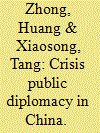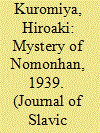| Srl | Item |
| 1 |
ID:
132044


|
|
|
|
|
| Publication |
2014.
|
| Summary/Abstract |
Leon Trotsky, founder of the Soviet Red Army, once lamented "You Lmay not be interested in war, but war is interested in you".' His words are highly relevant to crisis public diplomacy today. Although not enough attention is paid to it, crisis public diplomacy is destined to become vital and complementary to other diplomacies in an era of frequent crisis. It mestic diplomatic strategies and appears to be very conspicuous in international affairs. This was clearly indicated in the report made by former General Secretary Hu Jintao at the 18th Congress of the CPC (Communist Party of China), as follows: "At present, as the global, national and our Party's conditions continue to undergo profound changes, we are faced with unprecedented opportunities for development as well as risks and challenges unknown before." Having a clear understanding of different situations, guarding against risks, dealing with challenges, solving crises and exploiting opportunities have become very real issues. China needs to follow the trend and engage in crisis public pressing times. Through overall coordination it will be control crises. and establish a positive image plays a prominent role in do diplomacy in these able to erase risks to security
|
|
|
|
|
|
|
|
|
|
|
|
|
|
|
|
| 2 |
ID:
109103


|
|
|
|
|
| Publication |
2011.
|
| Summary/Abstract |
The Battle of Nomonhan ended decisively in favor of the Soviet Red Army. Yet why it turned out so has not always been clearly understood. In fact, there are other mysteries about Nomonhan: why small skirmishes turned into a major battle, why the command of the Japanese troops (especially its core force, the 23rd Division) was so poor, why the Division Commander Michitaro Komatsubara behaved so peculiarly throughout the battle and after. The present essay suggests that Komatsubara's treachery provides an explanation to these mysteries; he appears to have been a Soviet agent.
|
|
|
|
|
|
|
|
|
|
|
|
|
|
|
|